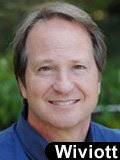 Wealthy, self-funded candidates for federal offices rarely win, a recent analysis shows, but the two candidates from New Mexico who have contributed the most to their campaigns this year say they’ll buck that trend.
Wealthy, self-funded candidates for federal offices rarely win, a recent analysis shows, but the two candidates from New Mexico who have contributed the most to their campaigns this year say they’ll buck that trend.
The analysis from the
In New Mexico, two Democratic U.S. House candidates – Harry Teague in the 2nd Congressional District and Don Wiviott in the 3rd Congressional District – have contributed enough to trigger the Millionaire’s Amendment in those House primaries. Wiviott has loaned his campaign $990,000. Teague has loaned his campaign $684,572.92.
 They are among at least 21 House and Senate candidates nationwide who have contributed enough to their campaigns this election cycle to trigger the Millionaire’s Amendment.
They are among at least 21 House and Senate candidates nationwide who have contributed enough to their campaigns this election cycle to trigger the Millionaire’s Amendment.
The CQ article doesn’t provide an analysis of why wealthy, self-financing candidates usually lose under the current system, and
Teague said he knows the reason, adding that the losing trend of wealthy self-financers is one he’ll beat.
“Most of those candidates had never run for elected office, while I have run successfully in a Republican county commission district,” Teague said in a statement released by his office. “Further, many ‘self-financed’ candidates have not enjoyed widespread financial support, whereas my campaign has already raised more money from outside contributors than any Democratic primary campaign in the 2nd Congressional District. I am sure these differences will be demonstrated when we win on June 3 and in November.”
Spokesman Webster Cash said Wiviott is similarly confident because he has earned strong, grassroots support.
“The influence of money in campaigns is dwarfed by a candidate’s ability to personally connect with voters,” Cash said. “… The fact that certain campaigns share similar attributes is not an indicator of how successful they will be on Election Day. Our campaign has the advantage of momentum and a powerful grassroots organization that we are confident will propel us to victory in both June and November.”
In the 3rd District
Wiviott primary opponent Ben R. Luján was able to capitalize on the increased contribution limits during the first quarter of 2008. He had a number of contributions greater than $2,300, including several for $6,900 each. Another Wiviott primary opponent, Benny Shendo Jr., has also accepted $6,900 apiece from two individuals. But Wiviott has vastly outspent his opponents.
Luján spokesman Mark Nicastre said candidates who can lend themselves lots of money “can afford high-priced consultants, but money can’t buy the support of the people of
“We knew we were going to be outspent, but there are things we needed to do to keep our lead and remain the frontrunner, and we have done that,” he said. “The support we have received from the leading environmental organizations in the country and from working men and women through organized labor has helped counteract our opponent’s ability to fund himself.”
Nicastre said Wiviott’s self-financing highlights the need for mandatory public financing to level the playing field.
Todd Doherty, Shendo’s campaign manager, said voters know that money is a “corrupting force in politics.” He characterized the 3rd District race as being between Wiviott, who he called “a rich land developer on an ego trip;” Luján, who he called the “completely unqualified” son of the speaker of the state House and someone “who has never earned a job on his own;” and Shendo, “who is actually qualified to credibly represent us in Washington, D.C.”
“We are simply letting real voters meet the candidates, all the candidates, and letting them see the obvious,” Doherty said.
Rudy Martin, another 3rd District Democratic candidate, said voters there are disenfranchised because their economic situation is poor. He said television ads may affect voters in urban areas, but rural voters will pick the candidate who best represents their values, regardless of money.
“I have intentionally limited funds to show my respect for the people of the district,” Martin said. “I represent the people who do not have the big-business monies or the political connections.”
In the 2nd District
Teague triggered the Millionaire’s Amendment last week, so no public report indicates whether primary opponent Bill McCamley has been able to capitalize on the increased contribution limits. McCamley campaign spokesman Michael Ward said the CQ article, as well as the failed campaigns of Mitt Romney and others, prove that money is necessary but not sufficient to win.
McCamley, like Luján in the 3rd District, has raised a respectable amount of money that in many years might have made him the top fundraiser in the race. Self-financing candidates change the dynamic, however, and Teague has been running television ads for several weeks, while voters have yet to see a McCamley commercial.
McCamley mocked the $475,000 Teague loaned his campaign in April by loaning himself $47.50 to buy gas. It was a publicity stunt that earned McCamley some media attention, including coverage by newspaper and television outlets.
Asked what advantage Teague’s money gives his campaign, Ward said it will allow Teague to air more television ads, but it also “draws attention to the fact that he is an oil millionaire who profits from the high gas prices that hurt middle-class New Mexicans.” The even bigger problem for Teague, Ward said, is that he is refusing to debate McCamley. McCamley has said Teague’s rejection of his recent debate challenge, combined with his self-financing, creates the appearance that Teague is trying to buy the seat.
“How does (Teague) plan to stand up to the Republicans in November or his oil-industry contributors if he were to make it to
As I’ve disclosed in the past, I’m friends with McCamley. Click here to read about that.